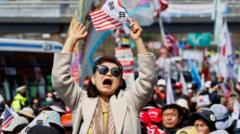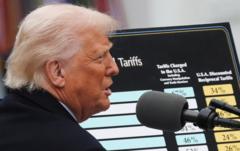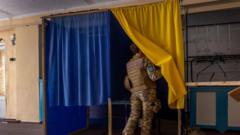As the country navigates the fallout, it faces deeper divisions and a critical election ahead.
**Uncertainty Ahead: South Korea's Transformation Post-Impeachment**

**Uncertainty Ahead: South Korea's Transformation Post-Impeachment**
South Korea confronts a crucial political juncture following President Yoon Suk Yeol's impeachment.
South Korea is bracing for monumental changes in its political landscape after the Constitutional Court voted unanimously to impeach President Yoon Suk Yeol. The verdict comes after months of turmoil stemming from Yoon's controversial move to invoke martial law last December in a failed bid to assert control over Parliament. The decision to remove him has left many South Koreans expressing a mixture of relief and anxiety as they contemplate what lies ahead.
Yoon's presidency became embroiled in a series of crises that saw him suspended from duty following his impeachment by the National Assembly. Friday's ruling was met with celebrations by critics and solemnity among his supporters, all gathering in various regions to witness the historic judgement. The court's condemnation of Yoon's actions underscored that his military attempts were unjustifiable, with judges articulating that such actions violated democratic principles and threatened civil rights.
Moving forward, South Korea must orchestrate a snap election by June 3 to elect a new leader. This transition, however, occurs amid a deeply polarized public. Although Yoon's actions in December initially united many against him, they also birthed a fervent base of supporters who believe he is a victim of political machinations, further complicating the nation's unity.
The turmoil has deepened the rifts in South Korean society, with growing conspiratorial narratives gaining traction among right-leaning populations. This includes claims of infiltration by outside forces scuttling Yoon's presidency. As protests against perceived judicial corruption and election improprieties continue, public trust in institutions remains critically endangered.
Yoon's party, the PPB, has acknowledged the court's decision while he himself has not opted for a graceful departure. Although he cannot appeal the ruling, his refusal to concede could foster further disruption. Amid these challenges, South Korea's acting leadership faces crucial international pressures, especially concerning relations with the U.S. and North Korea. The geopolitical dynamics underscore a pressing need for effective, unifying governance, as South Korea has been left without a stable leader for an extended period.
In this context of fragmentation and uncertainty, all eyes are on the upcoming election, with South Koreans longing for a leader who can heal the divisions and ascend to face new challenges posed by both domestic and international spheres. As the nation rapidly approaches this critical juncture, the interplay between discontent, trust, and the necessity for democracy will define the next chapter in South Korea's journey.
Yoon's presidency became embroiled in a series of crises that saw him suspended from duty following his impeachment by the National Assembly. Friday's ruling was met with celebrations by critics and solemnity among his supporters, all gathering in various regions to witness the historic judgement. The court's condemnation of Yoon's actions underscored that his military attempts were unjustifiable, with judges articulating that such actions violated democratic principles and threatened civil rights.
Moving forward, South Korea must orchestrate a snap election by June 3 to elect a new leader. This transition, however, occurs amid a deeply polarized public. Although Yoon's actions in December initially united many against him, they also birthed a fervent base of supporters who believe he is a victim of political machinations, further complicating the nation's unity.
The turmoil has deepened the rifts in South Korean society, with growing conspiratorial narratives gaining traction among right-leaning populations. This includes claims of infiltration by outside forces scuttling Yoon's presidency. As protests against perceived judicial corruption and election improprieties continue, public trust in institutions remains critically endangered.
Yoon's party, the PPB, has acknowledged the court's decision while he himself has not opted for a graceful departure. Although he cannot appeal the ruling, his refusal to concede could foster further disruption. Amid these challenges, South Korea's acting leadership faces crucial international pressures, especially concerning relations with the U.S. and North Korea. The geopolitical dynamics underscore a pressing need for effective, unifying governance, as South Korea has been left without a stable leader for an extended period.
In this context of fragmentation and uncertainty, all eyes are on the upcoming election, with South Koreans longing for a leader who can heal the divisions and ascend to face new challenges posed by both domestic and international spheres. As the nation rapidly approaches this critical juncture, the interplay between discontent, trust, and the necessity for democracy will define the next chapter in South Korea's journey.


















